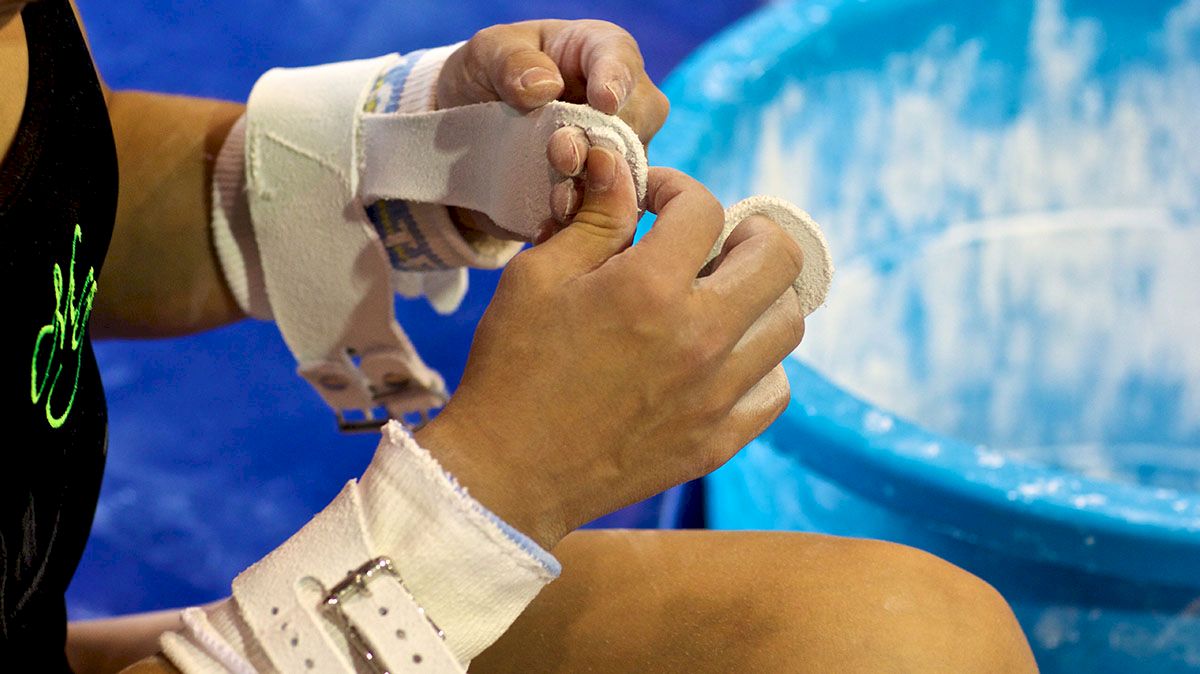Is Your Gymnast At Risk for An Eating Disorder? (Part 3 of a 4 pt series)
Is Your Gymnast At Risk for An Eating Disorder? (Part 3 of a 4 pt series)
Is Your Gymnast At Risk for An Eating Disorder? (Part 3 of a 4 pt series)



Here are excerpts from two emails I received. The names of these athletes have been changed to respect their anonymity. I am extremely thankful to these women and the other’s who shared their stories of eating disorders with me in effort to bring awareness to this potential problem among gymnasts and other athletes.
FROM MARY-
“I am now a Division 1 college gymnast, but for several years I have struggled with an eating disorder that almost had me give up the sport. In high school had lost a noticeable amount of weight and my coaches expressed a mild level of concern- but at the same time they were berating one of my teammates who had gained a normal amount of weight while going through puberty. This further fueled my desire to lose weight and instilled an intense fear of gaining weight. After an injury and being forced to stay out of the gym for months I gained some of the weight back and a dangerous yoyo cycle of gaining and losing weight began. After a long break from the sport and lots of therapy for my eating disorder, I returned to the gym and may even get to compete sometime in the future.
I can’t blame anyone for my eating disorder, but I do think there needs to be better awareness and education for everyone involved. “
FROM AMANDA-
“I started to develop an eating disorder in my junior year of high school. By the time I was diagnosed I was very malnourished and my heart was in bad shape. I felt a lot of pressure from the coaches to win and I felt if I lost weight I would be better. Eventually, I developed osteopenia and finally entered a program for eating disorders.
I love that you are bringing light to this subject because it is so prevalent in this sport.”
The Startling Statistics
As touched upon in the previous blog, the pressure to be thin in today’s society is higher than ever. In fact, the body type portrayed in advertising as the ideal is possessed naturally by only 5% of American females. A gymnast is not only bombarded with the typical social and media pressure to be thin, but is also faced with coaches, parents, and judges that may encourage and even expect an unnecessary and unhealthy body weight. Disordered eating in gymnasts is real, as evidenced in the emails above. And it’s a problem that we should all become more aware of.
Forty-three percent of 1st-3rd grade girls want to be thinner and 81% of 10 year olds are afraid of being fat.
Anorexia is the third most common chronic illness among adolescents. Additionally:
*95% of those who have eating disorders are between the ages of 12 and 26.
*Over ½ of teenage girls use unhealthy weight control behaviors such as skipping meals, fasting, vomiting and taking laxatives.
*Eating disorders have the highest mortality rate of any mental illness
The Risk for Eating Disorders in Gymnasts
There is no doubt that the benefits of participating in sports offers far outweigh the risks. Improved self-esteem, body image, fitness level, health and the base for an active lifestyle are just a few of the advantages to athletics. Yet, according to the National Eating Disorders Association, some sports put athletes at a far greater risk for developing disordered eating. In fact, female athletes in aesthetic sports, such as gymnastics, are found to be at the highest risk for eating disorders. Elite athletes are found to have a higher rate of eating disorders than in a female control group 20% vs. 9%. In judge’s sports, such as gymnastics, the prevalence of eating disorders is 13% compared to 3% in refereed sports.
Risk Factors for Eating Disorders
*Sports that emphasize appearance, weight requirements or muscularity (such as gymnastics, body building and wrestling)
*Sports that focus on the individual rather than just the team (such as gymnastics, figure skating or diving)
*Sports with an overvalued belief that lowered body weight will improve performance.
*Sports that athletes typically begin in childhood or athletes in elite sports
*Low self-esteem; family dysfunction; families with eating disorders, chronic dieting history, physical or sexual abuse, peer, family or cultural pressures to be thin and other traumatic life experiences
*Coaches who focus primarily on success and performance.
Any of these factors can contribute to the vulnerability to develop an eating disorder.
The Typical Scenario in Gymnastics
Gymnasts are supposed to be tiny- that’s the common belief. Smaller, shorter, and leaner athletes more effortlessly and safely perform gymnastic skills. Height and weight of athletes’ are often reported, as though it’s a sign of their impending success or failure. I remember when Jordyn turned elite at age 10—there was a new focus on her genetics. How tall were her parents? What? Her mother is 5’6” – she will end up too tall!!! What will happen when she hits puberty? As a mom, I felt helpless sitting there waiting for my daughter to spout up into the “too tall for gymnastics” range. I kept myself calm by remembering that her dad was only 5”9”, her great grandpa was 5’6’ and her great grandmother was 4’10”. I prayed that she had the “short gene”. I never worried about weight—that was a “controllable” factor. Height was out of my hands.
But, what eventually happens, despite anyone’s control is called PUBERTY. No matter how small your gymnast is, they WILL hit puberty. They WILL turn into women. For some, that could l happen at age 10 or younger, for others, it might not happen until their late teens. But it WILL happen.
I believe this is the crucial moment for coaches and parents and how they respond to their athlete’s bodily changes.
The Risks of Having an Eating Disorder- The Female Athlete Triad
When athletes are losing weight, the initial response is often positive. Coaches are happy, parents are happy, they receive compliments, and it’s all good!!
But if that weight loss is the result of inadequate nutrition, they become at risk for long-term eating disorders and a syndrome called the Female Athlete Triad.
The Female Athlete Triad is a syndrome of 3 related conditions that are seen when female athletes are not meeting their energy requirements (getting enough nutrition to perform their training.). They are actually UNDERnourashed as demonstrated by these three components:
1) Energy Deficit or Disordered Eating (i.e.: not eating enough calories to meet their needs)
2) Menstrual Irregularities
3) Decreased Bone Density or Osteoporosis (increased risk for bone fracture or stress fractures)
The warning signs to look for are as follows….
*Irregular or missed periods
*Chronic fatigue (tired all the time)
*Insomnia or sleep disturbances
*Recurrent stress fractures
*Frequent or recurrent injuries or illness
*Restricting calories or skipping meals
*Obsession with thinness and body image
*Cold hands and feet
These warning signs should be taken seriously. While the weight loss accomplished from disordered eating might initially help their sports performance, it will ultimately REDUCE sports performance.
A diet deficient in nutrition can lead to fluid and electrolyte imbalances that can effect many body systems including the cardiovascular, endocrine, reproductive, skeletal, gastrointestinal, renal and the central nervous system.
In the worst-case scenario, which as been the case in some gymnasts, is sudden death. This is no light matter. A girl or woman in this triad puts a tremendous strain on EVERY system of the body.
Is Your Daughter at Risk?
How do you know if your daughter is heading down the disordered eating path? Ask yourself these questions…
1) Has she had significant weight loss?
2) Is she preoccupied with food and weight?
3) Is she increasingly critical of her body?
4) Does she frequently eat alone
5) Is she using laxatives?
6) Is she compulsively exercising?
7) Is she complaining of always being cold?
If you are concerned the first step is to seek medical attention. A visit to the doctor for a complete physical, blood work and possibly a bone density test can help to determine if your athlete is getting enough nutrition.
An athlete with a true eating disorder will require treatment with a multidisciplinary team including a physician, nutritionist, counselor, coach and parents. There are many successful strategies for recovery.
Nutrition and Athletes
So, consider this scenario…. Your daughter has always been tiny and very successful in gymnastics. She is now hitting puberty and her body is changing. Her coach is telling her she’s fat. You are worried that she’s going to fall behind in gymnastics. Your daughter tells you the coach isn’t paying any attention to her anymore. You start to notice she isn’t eating after practice and you are not sure what she eats all day while at school. You let things slide for a while, because you want her to excel at gymnastics just as much as she does. And, after all, if her coach is telling her she’s fat, she must need to lose weight. But after a few months, you notice she seems very tired, gaunt looking and started complaining about back pain. A couple of months later she is diagnosed with a lumbar stress fracture and is placed in a back brace for 3 months. She’s missed her J.O. season and now seems like she’s really gaining weight because she can’t practice 5 hours a day.
What do you do to get your daughter healthy and back at the top of her game in gymnastics at this point?
This is your chance to educate yourself on sports nutrition. This is your chance to help your daughter refocus on how they FEEL and their energy levels rather than the scale or the meal. Healthy eating is the solution and the bottom line!
Next week’s blog will cover sports nutrition with real-life ideas considering the busy gymnast’s schedule. Stay tuned!!
Rita Wieber is a Registered Nurse with a Master's Degree in Exercise Physiology and Health Education. She is the author of Gym Mom: The Twists and Turns of Your Daughter's Gymnastics Career and mother of 4 including World Champion and Olympic Team Gold Medalist Jordyn Wieber. Visit her website at www.gymmom.net.